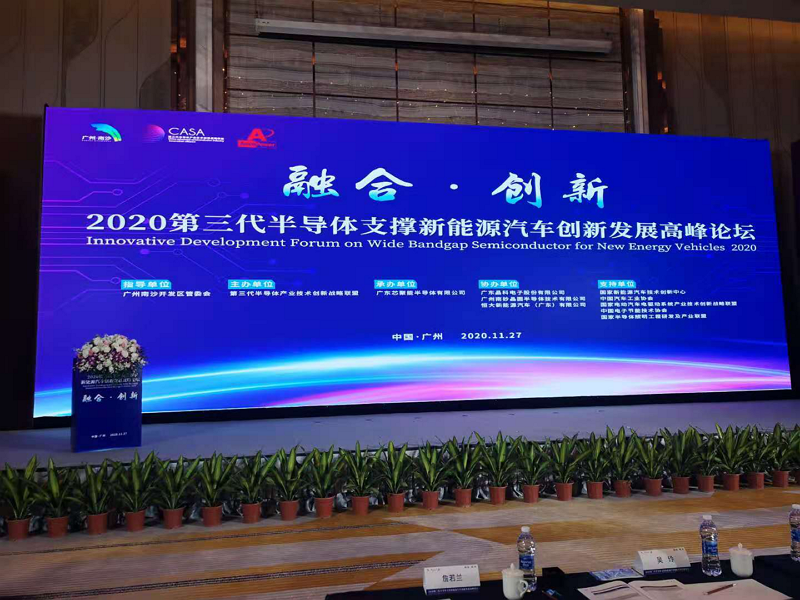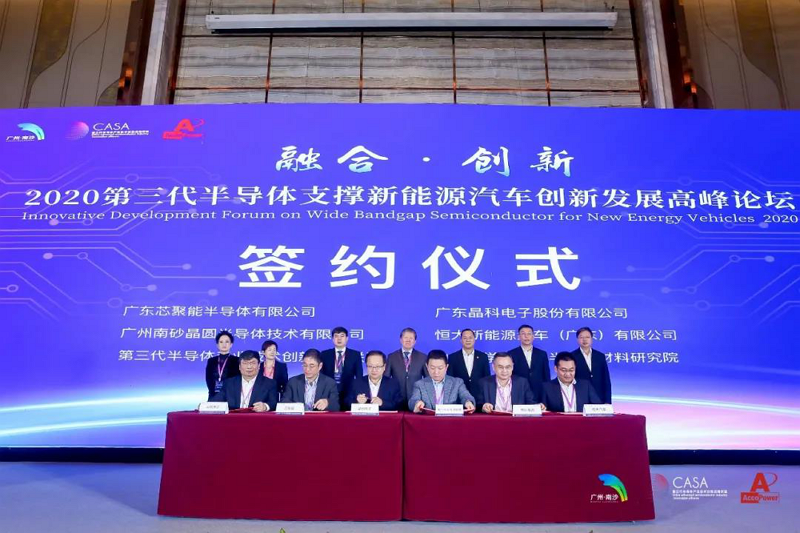The Third Innovative Development Forum on Wide Bandgap Semiconductor for New Energy Vehicles Held
On November 27, 2020, the Innovative Development Forum on Wide Bandgap Semiconductor for New Energy Vehicles 2020 was held in Nansha District, Guangzhou. The following leaders attended this forum: Cao Jianlin, Former Vice Minister of the Ministry of Science and Technology (MOST), Director of the Advisory Committee of the China Advanced Semiconductor Industry Innovation Alliance (CASA); Lu Yixian, Secretary of Commission of Nansha District; Lei Peng, Deputy Director of Department of High and New Technology of the MOST; He Dihua, the second-level inspector of the Department of Science and Technology of Guangdong Province; Zhan Ruolan, the second-level inspector of the Department of Industry and Information Technology of Guangdong Province; leaders of Guangzhou Municipal Science and Technology Bureau and Guangzhou Municipal Industry and Information Technology; leaders of Nansha District, Dong ke, Xie Ming and Ouyang Liubing.

Cao Jianlin, Former Vice Minister of the MOST, gave a warm speech with deep expectation. Lei Peng, Deputy Director of Department of High and New Technology of the MOST, expressed that the experts, scientific and technological workers and entrepreneurs at this forum would reach consensus, deepen cooperation, further promote the third generation of semiconductors with technological innovation and cross integration in the field of new energy vehicles, and contribute wisdom and strength to the realization of technological self-reliance and high-quality industrial development. Xie Ming, Executive Deputy Chief of Nansha District, introduced that Nansha District has formed the full industry chain in the third-generation semiconductor from wafer production to chip design, packaging and application, represented by Jinke and Aisiwei, and led by Linlux Electronics and Xinjuneng. In the future, Nansha will rely on the existing industrial foundation and give priority to supporting the R&D of advanced semiconductor industry technology and the development of industrial clusters for core components of new energy and intelligent networked vehicles, and build a third-generation semiconductor industry innovation and development highland.
Hundreds of industry elites from the leading companies in the third-generation semiconductor industry attended the meeting to jointly conduct in-depth exchanges and discussions on the promotion of the development of new energy vehicles and the third-generation semiconductor industry, including Chen Xiaohong, researcher of the Development Research Center of the State Council and member of the Academic Committee of the Development Research Center of the State Council; Xu Yanhua, Deputy Secretary-General of the China Association of Automobile Manufacturers; Cai Wei, Chief Scientist of the Research Center for Automotive Electronic Drive Control and System Integration Engineering of the Ministry of Education; Wen Xuhui, the researcher of the Institute of Electrical Enginnering Chinese Academy of Sciences and the professor of the University of Chinese Academy of Sciences; Cheng Hong, the senior expert of IPU hardware development of Xiaopeng Automotive Powertrain Center; Georges Andary, President of Bosch Automotive Electronics Division China; and Cao Zhiping, General Manager of STMicroelectronics China.
This forum is hosted by China Advanced Semiconductor Industry Innovation Alliance (CASA). The forum concerns on establishing a structurally complete, independent and controllable industrial system and the third-generation semiconductor in key links of the industrial chain such as basic materials, key components and control systems for new energy vehicles. This forum provides a good docking platform for innovative institutions and enterprises in the two fields to better meet the major national needs and promote the application of third-generation semiconductors in new energy vehicles.
During the forum, the following six companies and organizations jointly signed to substantially promote the construction of the Innovation Center of Third Generation Semiconductor in Nansha District, Guangzhou: Guangdong Xinjuneng Semiconductor Co., Ltd., APT Electronics Co., Ltd., Guangzhou Nansha Wafer Semiconductor Technology Co., Ltd., Evergrande New Energy Automobile (Guangdong) Co., Ltd., Institute of New Generation Semiconductor of Shandong University, and China Advanced Semiconductor Industry Innovation Alliance (CASA).

It is understood that the Innovation Center is, a non-profit organization with mechanism and system innovation, established under the guidance of the Nansha Development Zone Management Committee, and based on the basic ideas of enterprise leadership, industry participation, government support, and open sharing. The center aims to promote the transformation and upgrading of Nansha's new energy automobile industry and the innovative development of the third-generation semiconductor strategic emerging industries, and to create an influential domestic new energy vehicle and third-generation semiconductor integration innovation source and service platform.
The center will gather domestic and external resources, actively guide and encourage upstream and downstream enterprises, universities and scientific research institutes to participate in the joint construction of the industry, apply technology development models in the industry, establish product standard testing systems, sustainable business model innovation, and global academic exchange, professional consulting, training, and other aspects of carrying out exploratory work to promote the integration and innovation and cluster development of Nansha's third-generation semiconductor and new energy automobile industries, and give full play to the advantages of Nansha's third-generation semiconductor enterprises in innovation.
A group of experts and scholars are invited to guide the construction of the center with Qiu Yufeng, the former dean of the Global Energy Internet Research Institute; Zhang Guoqi, co-director of the International Advisory Committee of CASA; and Cai Wei, professor of Harbin University of Science and Technology.
